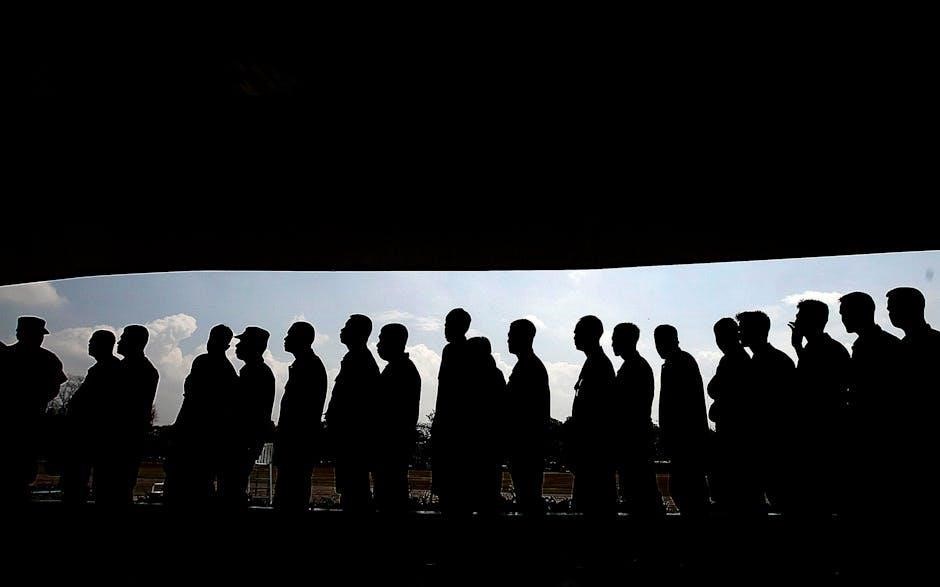
the burnout society pdf
In The Burnout Society, Byung-Chul Han explores the societal shift from disciplinary to achievement-oriented cultures, where individuals internalize control, leading to widespread burnout and mental exhaustion.
1.1 Overview of Byung-Chul Han’s Book
In The Burnout Society, Byung-Chul Han critically examines the societal shift from disciplinary regimes to achievement-oriented cultures. He argues that modern society, driven by neoliberal capitalism, compels individuals to internalize control, leading to self-exploitation and burnout. Han explores how constant performance demands and multitasking erode mental and physical well-being, fostering a culture of exhaustion. The book, originally published in German as Müdigkeitsgesellschaft and translated into English by Erik Butler, offers a philosophical critique of contemporary society, linking burnout to the pervasive influence of capitalist ideologies and the suppression of negativity in favor of relentless positivity.
1.2 The Transition from Disciplinary to Achievement Societies
Byung-Chul Han examines the shift from disciplinary societies, where control was externally imposed, to achievement societies, where individuals internalize control. In disciplinary societies, power operated through institutions like schools, factories, and prisons. However, in achievement societies, individuals voluntarily submit to self-exploitation, driven by the imperative to perform and succeed. This transition, rooted in neoliberal capitalism, fosters a culture of relentless competition and productivity, leading to burnout. Han argues that this internalized control is more insidious, as it masks exploitation under the guise of freedom and self-realization, ultimately eroding mental and physical well-being.
1.3 The Concept of Burnout in Modern Society
Byung-Chul Han defines burnout as a pathological state of exhaustion, rooted in modern society’s relentless demands for productivity and achievement. Unlike mere fatigue, burnout reflects a deeper societal crisis, where individuals are drained of their mental, emotional, and physical resources. It arises from the internalization of societal pressures, leading to a loss of meaning and purpose. Burnout is not just an individual failure but a systemic issue, symptomatic of a culture that prioritizes efficiency and performance over human well-being. Han argues that it signals a broader societal malfunction, exacerbated by the erosion of community and the rise of neoliberal values.

The Causes of Burnout in Contemporary Society
The rise of capitalism, neoliberalism, and the culture of constant performance drive burnout, as individuals are pressured to prioritize productivity over well-being, leading to mental and physical exhaustion.
2.1 The Role of Capitalism and Neoliberalism
Capitalism and neoliberalism are central drivers of burnout, fostering a culture of relentless competition and productivity. Byung-Chul Han argues that these systems commodify human life, turning individuals into self-exploiting entrepreneurs. The constant pressure to achieve and perform erodes personal boundaries, leading to mental and physical exhaustion. Neoliberal ideals promote efficiency and endless growth, leaving little room for rest or failure. This societal framework perpetuates the internalization of control, where individuals blame themselves for not meeting unrealistic expectations, further exacerbating burnout and alienation in modern societies.
2.2 The Internalization of Control and Self-Exploitation
In The Burnout Society, Byung-Chul Han highlights how individuals internalize societal pressures, transforming into self-exploiters. This internalization of control arises from the demands of achievement-oriented societies, where people push themselves to meet unrealistic expectations. Unlike external discipline, self-exploitation is voluntary yet oppressive, leading to burnout. Han argues that modern individuals become their own “drillmasters,” perpetuating a cycle of overwork and mental exhaustion. This phenomenon reflects a deeper societal issue, where the pursuit of productivity and perfection fosters an inability to pause or rest, ultimately eroding mental and physical well-being;
2.3 The Impact of Multitasking and Constant Performance
Byung-Chul Han emphasizes how multitasking and the demand for constant performance exacerbate burnout in modern society. The expectation to juggle multiple tasks simultaneously fosters a culture of perpetual busyness, leading to mental overload. Individuals are pressured to perform optimally at all times, leaving little room for rest or reflection. This relentless drive for efficiency erodes mental and physical resilience, contributing to widespread exhaustion. Han critiques the societal glorification of multitasking, arguing that it undermines productivity and deep thinking, further entrenching the cycle of burnout and mental fatigue in contemporary achievement-oriented cultures.

The Effects of Burnout on Individuals and Society
Burnout causes mental and physical exhaustion, leading to depression and societal fragmentation. It erodes community bonds and diminishes overall well-being, as individuals struggle to cope.
3.1 Mental and Physical Health Consequences
Burnout leads to severe mental and physical health issues, including chronic fatigue, anxiety, and depression. Prolonged stress weakens the immune system, increasing susceptibility to illnesses. Mental fatigue impairs cognitive function, reducing productivity and creativity. The constant pressure to perform exacerbates these conditions, creating a vicious cycle of deteriorating health. If left unaddressed, burnout can lead to long-term damage, affecting both personal and professional aspects of life. It is crucial to recognize these symptoms early to prevent further harm and promote recovery.
3.2 The Rise of Mental Fatigue and Depression
Mental fatigue and depression have surged in modern society, closely linked to burnout. The constant demand for productivity and achievement overwhelms individuals, leading to emotional exhaustion. Byung-Chul Han highlights how the suppression of negativity in a hyper-positive culture exacerbates these conditions. Mental health issues are further aggravated by the lack of adequate rest and the pressure to maintain performance. This societal trend reflects a deeper crisis, where individuals struggle to cope with the demands of contemporary life, resulting in widespread psychological distress and a diminished quality of life.
3.3 Social Implications and the Erosion of Community
The burnout society fosters a culture of isolation, eroding communal bonds and social cohesion. Byung-Chul Han argues that the relentless pursuit of achievement and productivity isolates individuals, weakening collective support systems. The erosion of community leaves people without shared frameworks to address mental health challenges, exacerbating feelings of loneliness and disconnection. This societal fragmentation reflects a broader crisis, where individuals struggle to maintain meaningful relationships amid the pressures of modern life, further perpetuating cycles of burnout and mental exhaustion. The loss of community underscores the urgent need for societal transformation to reclaim shared well-being and connection.

Philosophical Underpinnings of Burnout
Byung-Chul Han’s critique of modern society reveals how the suppression of negativity and the cult of positivity fuel burnout, drawing on Eastern philosophy to advocate for balance and introspection.
4.1 Byung-Chul Han’s Critique of Modern Society
Byung-Chul Han critiques modern society for fostering a culture of hyper-productivity and relentless positivity, which he argues leads to mental and physical exhaustion. He contends that capitalism and neoliberalism have transformed individuals into self-exploiting machines, unable to cope with the pressures of constant achievement. Han emphasizes that this shift from disciplinary societies to achievement societies has eroded traditional forms of community and solidarity, leaving individuals isolated and burned out. His analysis highlights the urgent need for a paradigm shift to reclaim balance and meaning in life;

4.2 The Role of Positivity and the Suppression of Negativity
Byung-Chul Han argues that modern society’s obsession with positivity has led to the suppression of negative experiences, creating a culture of emotional repression. He contends that this relentless emphasis on optimism prevents individuals from confronting and processing negativity, ultimately contributing to burnout. Han critiques the capitalist-driven narrative that equates success with constant positivity, asserting that this mindset fosters alienation and mental exhaustion. By ignoring the value of negative emotions, society perpetuates a cycle of psychological distress, highlighting the need to reclaim a balanced approach to emotional well-being.
4.3 The Influence of Eastern Philosophy on Han’s Ideas
Byung-Chul Han’s work is deeply influenced by Eastern philosophy, particularly Daoist and Buddhist concepts. He draws on these traditions to critique the excesses of Western hyper-productivity and the cult of endless achievement. Han advocates for a return to mindfulness, stillness, and the embrace of non-action (wu-wei) as antidotes to burnout. He also explores the idea of absence and negativity in Eastern thought, suggesting these can foster a healthier relationship with time and self. This philosophical framework offers a counterpoint to the relentless positivity of modern society, emphasizing balance and introspection over constant striving.

Solutions and Alternatives to Burnout
Byung-Chul Han advocates for rethinking productivity, embracing rest, and incorporating philosophical insights to combat burnout. He emphasizes mindfulness, balance, and the value of non-action in a hyperactive world.
5.1 Rethinking Productivity and Achievement
Byung-Chul Han challenges the notion of relentless productivity, arguing that modern society’s obsession with achievement fuels burnout. He advocates for a shift in values, prioritizing well-being over output and embracing rest as essential to creativity and sustainability. Drawing from Eastern philosophy, Han suggests mindfulness and balance as antidotes to the exhaustion caused by constant performance. Redefining success to include non-productive time and introspection could alleviate societal burnout, fostering a healthier relationship with work and life. This rethinking encourages individuals to resist the pressures of hyper-efficiency and seek fulfillment beyond achievement.
5.2 The Importance of Rest and Contemplation
Byung-Chul Han emphasizes the necessity of rest and contemplation in a society driven by constant productivity. He argues that rest is not merely the absence of activity but a vital form of resistance against burnout. Drawing from Eastern philosophical traditions, Han suggests that stillness and mindfulness can counteract the exhausting demands of modern life. By valuing rest, individuals can reclaim their autonomy and foster creativity, challenging the notion that productivity is the sole measure of worth. Rest, in this context, becomes an act of liberation, allowing individuals to reconnect with themselves and find balance in a hyperactive world.
5.3 The Role of Philosophy in Addressing Burnout
Byung-Chul Han’s work underscores the role of philosophy in addressing burnout by offering a critical framework to reevaluate modern society’s values. He draws on both Western and Eastern philosophical traditions to advocate for a mindfulness that challenges the relentless pursuit of productivity. Han critiques the suppression of negativity in neoliberal cultures, arguing that embracing imperfection and stillness can foster resilience. His philosophical insights encourage individuals to question societal norms and seek balance, providing a foundation for personal and collective transformation in an era dominated by exhaustion and alienation. Philosophy, for Han, becomes a tool for liberation and renewal.
The Burnout Society remains a timely critique of modern life, urging a shift from relentless productivity to introspection and balance. Byung-Chul Han’s insights call for societal transformation to address exhaustion and alienation, fostering a healthier relationship between individuals and their world.
6.1 The Relevance of “The Burnout Society” Today
Byung-Chul Han’s The Burnout Society remains profoundly relevant in today’s fast-paced, hyper-connected world; The book’s exploration of exhaustion, mental fatigue, and societal pressures resonates deeply with contemporary challenges, such as remote work, digital overload, and the cult of productivity. Han’s critique of neoliberal capitalism and the internalization of self-exploitation continues to illuminate the root causes of widespread burnout. His ideas offer a critical lens through which to understand the growing mental health crisis and the erosion of work-life balance, making his work essential reading for anyone seeking to navigate modern life’s complexities.
6.2 The Need for a Paradigm Shift in Society
The Burnout Society underscores the urgent need for a paradigm shift in modern society. Byung-Chul Han argues that the current capitalist and neoliberal frameworks perpetuate burnout by fostering relentless competition and self-exploitation. He advocates for a radical rethinking of societal values, emphasizing rest, contemplation, and community over productivity and achievement. This shift requires breaking free from the cycles of consumerism and performance culture. By embracing a philosophy of absence and stillness, inspired by Eastern thought, society can move toward a more sustainable and humane way of living, prioritizing well-being over endless growth.
6.3 The Legacy of Byung-Chul Han’s Work
Byung-Chul Han’s The Burnout Society has left a profound impact on contemporary thought, reshaping discussions on mental health, capitalism, and societal structures. His critique of neoliberalism and the cult of productivity continues to resonate globally. Han’s work bridges philosophy and cultural critique, offering a unique lens to understand modern malaise. His later works, such as The Agony of Eros and The Spirit of Hope, further explore themes of burnout, absence, and renewal. As a leading philosopher, Han’s legacy lies in his ability to diagnose societal ills and inspire critical reflection, fostering a deeper understanding of human existence in late-modern times.